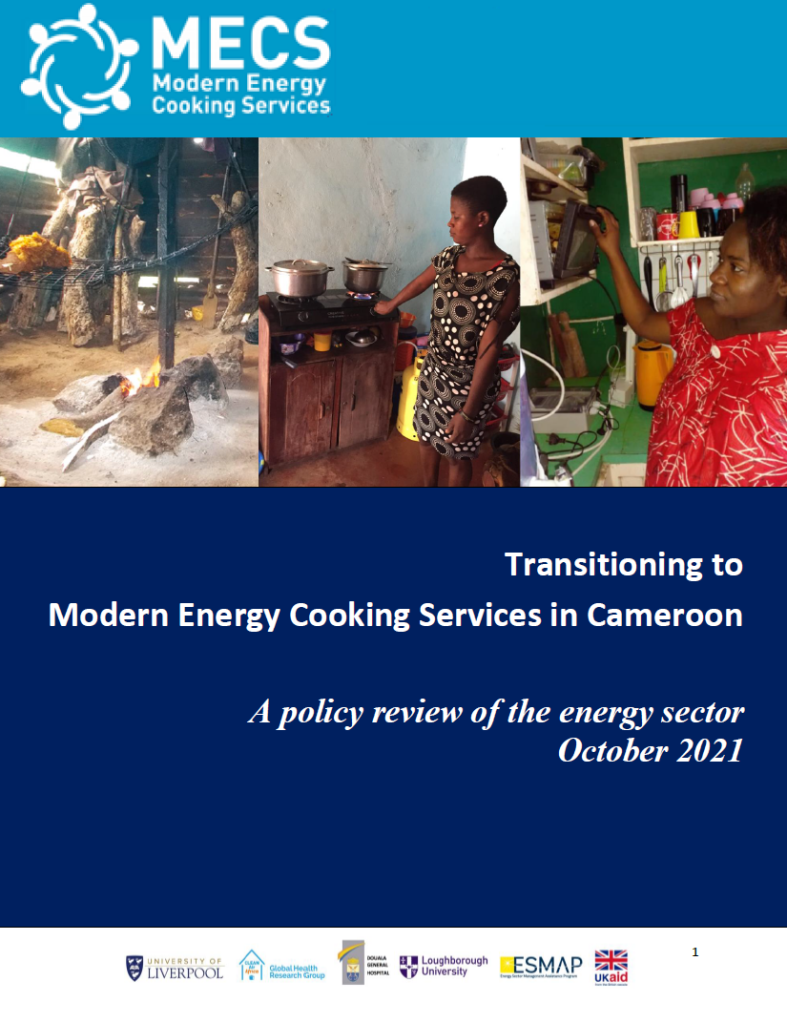- Date
- 4th November 2021
- Categories
By Dr. Elisa Puzzolo (The University of Liverpool), Dr. Fernando Rubinstein (The University of Liverpool), Mr. Emmanuel Betang (Douala General Hospital, Cameroon), Prof. Bertrand Mbatchou (University of Douala, Cameroon) and Prof. Daniel Pope (The University of Liverpool).
The University of Liverpool’s (UoL) CLEAN-Air(Africa) Global Health Research Group has completed a comprehensive review of energy sector policies related to modern energy cooking services (mecs) in Cameroon, Central Africa. This review forms part of their programme of research for the MECS programme to accelerate the transition to mecs in Cameroon.
Currently 69% of the population (17.1 million) rely on polluting solid fuels for cooking (49% in urban settings) with associated household air pollution from combustion of these fuels being responsible for 12,068 deaths and 5% of the total disease burden in the country in 2019 (see IHME GBD Results).
To address the environmental (including deforestation), climate and health impacts from reliance on solid fuels, a number of national clean energy ‘master plans’ have been drawn up/ published by Cameroon ministerial actors between 2013 and 2016 to support the expansion of use of electricity and gas for domestic energy. These include:
- The Electricity Sector Development Plan (PDSE) (2013), focusing on production and expansion of electric grids for the industrial sector and future exportation;
- The Master Plan for Rural Electrification (PDER) (2016), covering provision of access to electricity for rural localities with a target of 95% coverage by 2030; and
- The Liquefied Petroleum Gas (LPG) Master Plan (2016), presenting a roadmap for scaling up clean cooking with LPG to 58% of the population (18 million Cameroonians) by 2030.
To understand the potential for scale of mecs in Cameroon, a desk-based review of relevant policies, targets and country aspirations was conducted. In addition, interviews were conducted with key stakeholders from the government connected to decision making concerning the countries energy systems. These included Ministry of Water and Energy (MINEE) directorates for electricity and petroleum as well as local members of the Cameroon Power Africa Off-grid Project. To inform the potential for access to acquisition of mecs appliances for consumers, transect walks were carried out to the main electrical retail outlets of the two major cities of Cameroon (Douala and Yaoundé).
Whilst rates of electrification in Cameroon are relatively high compared to other Central African countries (around 60% of the population has access to electricity (90% urban; 26.7% rural)) and there are plans for wider national scale of access in the country – primarily to ensure energy access in rural areas and for the industrial sector, the use of electricity for cooking is very limited. According to the latest national representative survey data, less than 1% of the population reported using electricity for cooking (DHS, 2018).
Availability of electrical appliances for cooking is relatively limited with few options in the market, primarily in major retail outlets/ supermarkets in Douala and Yaoundé. However, electric hot plates and other electric cooking appliances are also sporadically available from second-hand retailers in both cities. These second hand shops are highly variable and typically depend on imported second hand goods from Europe shipped in containers to Cameroon, where content will vary considerably. For large-scale adoption of electricity for cooking, full availability of electric cooking appliances of different price ranges will be needed together with educational programs and awareness raising, in addition to overcoming access barriers related to the cost of electricity and the reliability of service provision given the current frequent blackouts.
In this context, the Cameroon government continues to be proactive in the promotion of clean cooking with LPG as a priority strategy to address the negative effects of reliance on wood fuel in terms of climate, energy security, deforestation and public health. This includes making steady progress in the implementation of the LPG Masterplan to achieve the announced 58% of the population target by 2030 (SDG7 time horizon) as well as exploring the potential for local bioLPG production from municipal solid waste, which will contribute to Cameroon’s circular and green economy.
